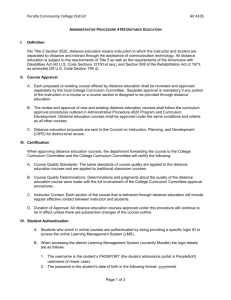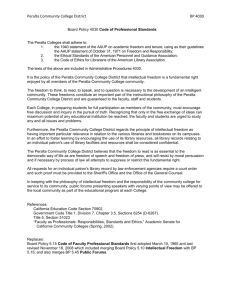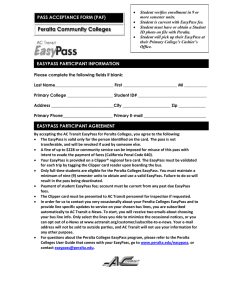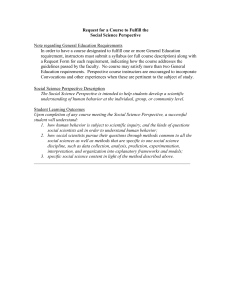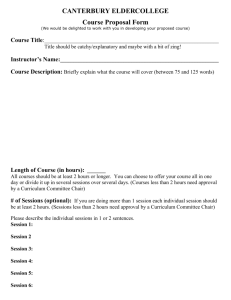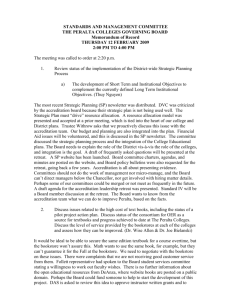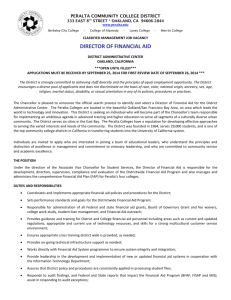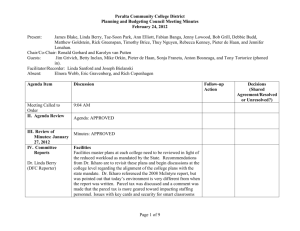AP 4020 Program, Curicullum, Course
advertisement
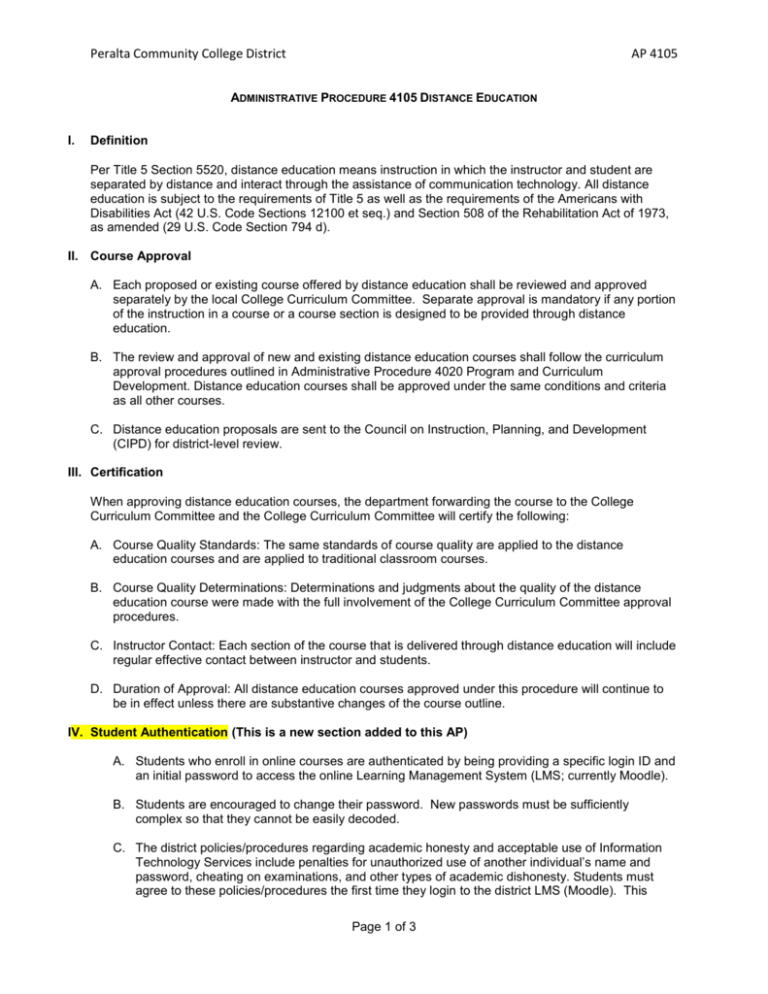
Peralta Community College District AP 4105 ADMINISTRATIVE PROCEDURE 4105 DISTANCE EDUCATION I. Definition Per Title 5 Section 5520, distance education means instruction in which the instructor and student are separated by distance and interact through the assistance of communication technology. All distance education is subject to the requirements of Title 5 as well as the requirements of the Americans with Disabilities Act (42 U.S. Code Sections 12100 et seq.) and Section 508 of the Rehabilitation Act of 1973, as amended (29 U.S. Code Section 794 d). II. Course Approval A. Each proposed or existing course offered by distance education shall be reviewed and approved separately by the local College Curriculum Committee. Separate approval is mandatory if any portion of the instruction in a course or a course section is designed to be provided through distance education. B. The review and approval of new and existing distance education courses shall follow the curriculum approval procedures outlined in Administrative Procedure 4020 Program and Curriculum Development. Distance education courses shall be approved under the same conditions and criteria as all other courses. C. Distance education proposals are sent to the Council on Instruction, Planning, and Development (CIPD) for district-level review. III. Certification When approving distance education courses, the department forwarding the course to the College Curriculum Committee and the College Curriculum Committee will certify the following: A. Course Quality Standards: The same standards of course quality are applied to the distance education courses and are applied to traditional classroom courses. B. Course Quality Determinations: Determinations and judgments about the quality of the distance education course were made with the full involvement of the College Curriculum Committee approval procedures. C. Instructor Contact: Each section of the course that is delivered through distance education will include regular effective contact between instructor and students. D. Duration of Approval: All distance education courses approved under this procedure will continue to be in effect unless there are substantive changes of the course outline. IV. Student Authentication (This is a new section added to this AP) A. Students who enroll in online courses are authenticated by being providing a specific login ID and an initial password to access the online Learning Management System (LMS; currently Moodle). B. Students are encouraged to change their password. New passwords must be sufficiently complex so that they cannot be easily decoded. C. The district policies/procedures regarding academic honesty and acceptable use of Information Technology Services include penalties for unauthorized use of another individual’s name and password, cheating on examinations, and other types of academic dishonesty. Students must agree to these policies/procedures the first time they login to the district LMS (Moodle). This Page 1 of 3 Peralta Community College District AP 4105 approach promotes a pedagogical focus rather than a punitive approach to academic honesty. This is an approach to educate students as to the consequences of academic dishonesty. D. Complete information about “Academic Dishonesty, Due Process, and Conduct” is posted on the district online education site, on the online education sites for each of the colleges, as well as on the LMS (Moodle) at the following link http://web.peralta.edu/de/for-students-what-is-academicdishonesty. E. Students also are authenticated through sufficient interaction between students and instructors which contributes to verifying a student’s identity. F. Instructors also can require a proctored examination which can serve as another method of authentication. G. The district Office of Educational Services, working collaboratively with representatives from the four colleges, Distance Education Coordinators, and Information Technology staff, assumes responsibility for monitoring the changing online education requirements for institutions of higher education, as well as options available for meeting the expectations of assuring a student’s identity. V. Federal financial Aid Eligibility: Consistent with federal regulations pertaining to federal financial aid eligibility, the District/Colleges authenticate or verify that the student who registers in a distance education is the same student who participates in and completes the course of program and receives the academic credit. A. The District/College will provide to each student at the time of registration, a statement of the process in place to protect student privacy and estimated additional charges associated with verification of student identity, if any. B. The colleges shall utilize one or more of these methods to authenticate or verify the student’s identity: 1. Secure credentialing/login and password 2. Proctored examinations 3. New or other technologies and practices which are effective in verifying student identification VI. Scheduling Instructors for Distance Education classes. A. The instructor must use or commit to using a recognized CMS/LMS (course or Learning management System) to deliver course content, which adheres to the following standards: 1. 2. 3. 4. Welcome/Orientation Organizational components Instructional modalities Assessment practices and expectations B. The instructor must have the following three elements in place prior to being assigned an online course: 1. Has received training in the use of at least one course management system (such as WebCT, Blackboard, ETUDES-NG, MOODLE) 2. Has successfully completed a course in how to teach online, such as “Teaching an Online Course” (offered by PCCD/Merritt College, @One, another community college, another appropriate external entity or UC extension course) Page 2 of 3 Peralta Community College District AP 4105 3. Uses the Peralta email system (with a peralta.edu email address) and has a Peralta webpage on the college website that hosts the online course. This webpage will provide a link to the CMS/LMS (course/learning management system) website C. Recommended preparation includes that the instructor: 1. Has enrolled in an online course of some kind 2. Has worked with a mentor who is an experienced online instructor D. Recommended ongoing instructor preparation should include maintaining currency in online education such as: 1. 2. 3. 4. 5. Technologies Pedagogy Collaborating with other online instructors Ongoing assessment of student learning outcomes Complete a certificate in online education (at least 3 and as many as 8 courses in online education for certification as an online instructor References: Title 5 Sections 55200 et seq.; 42 U.S. Code Sections 12100 et.seq.; 29 U.S. Code Section 794d; ACCJC Guide to Evaluating Distance Education and Correspondence Education; 34 Code of Federal Regulations Part 602.17 U.S. Department of Education regulations on the Integrity of Federal Student Financial Aid Programs under Title IV of the Higher Education Act of 1965, as amended Approved by the Chancellor: January 31, 2012 Page 3 of 3
